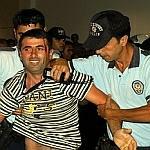The case against police officer Mehmet Ergin who killed 18-year-old Çağdaş Gemik is being retried upon the quashing of the verdict by the Court of Appeals. Police officer Ergin was sentenced to imprisonment of 16 years and eight months by a local court. He allegedly shot Gemik because the young man had ignored a stop warning.
Gemik was killed on 27 October 2008. The file came back to the Antalya 3rd High Criminal Court. At the first hearing on Wednesday (22 March), the decision of the Court of Appeals was read out. The trial was adjourned to 19 April because the Court President and both court board members were reported sick.
"Decision of Court of Appeals is contradictory"
Münip Ermiş, lawyer of the Gemik family, said in an interview with bianet that the decision given by the Court of Appeals was unlawful. Lawyer Ermiş pointed to contradictory statements in the decision and explained:
"On one hand, the Court of Appeals said that a situation that made the use of a weapon necessary was not given. On the other hand, it is stated that there is no concrete evidence that the police officer aimed and shot at vital parts of the body. However, the same report claimed that Çağdaş Gemik was killed with a single bullet shot through the nape of his neck which is a vital region of the body".
Ermiş said that the article suggested to be applied was the one on "death caused by the result of injury". The lawyer indicated that this article could be applied in case a person died as a result of injury caused by a police bullet that was shot at an arm or leg, hence "non-vital regions" of the body.
Lawyer Ermiş described that one of the tow bullets fired by the police entered Çağdaş Gemik's body through the nape of his neck and exited from his face. Nevertheless, the Court of Appeals concluded that the police shot without having aimed at vital parts of the body, Ermiş criticized
"Turkey violates Article 2 of the European Convention"
In a press statement released by Ermiş after the Wednesday hearing, he reminded the fact that Turkey was part of the European Convention on Human Rights and that according to Article 90 of the Constitution (Ratification of International Treaties), the case law of the European Court of Human Rights was part of the domestic law.
"The responsibilities defined by Article 2 of the European Convention on Human Rights on the Right to Life have to be met. National courts should never leave unpunished the behaviour of perceiving personal life as a good and/or inflicting financial or non-pecuniary damage. If a state official commits an offence in breach of Articles 2 and 3, the punishment must be appropriate according to the attack on the right to life", Ermiş said.
If the local court applied the decision of the Court of Appeals regarding "death caused by the result of injury", the punishment to be handed down to the defendant would certainly not be disproportionate to the offence committed, it was announced in the statement. In that case, Turkey would once more openly violate Article 2 of the Convention on the Right to Life, Ermiş emphasized. (EKN/EÖ/VK)











.jpg)


